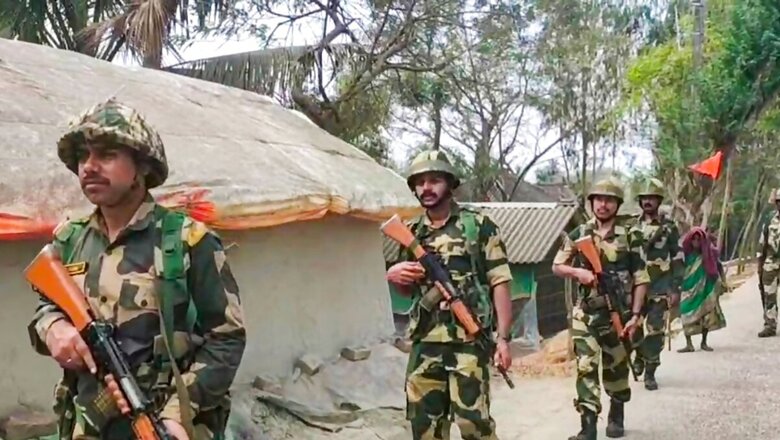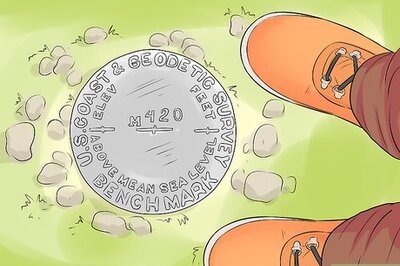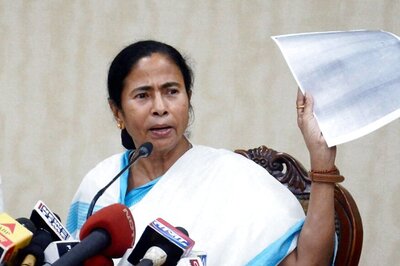
views
Sandeshkhali, which is a part of the Sunderbans, has not escaped the curse of the political malaise that has befallen West Bengal since 1947. A remote village, Sandeshkhali, has recently been at the centre of massive outrage against local TMC leader Shajahan Sheikh, with multiple accusations of land grabbing, intimidation, and rampant sexual abuse of village women.
The village was first on the news on January 7, 2024, when an Enforcement Directorate team raided Shajahan’s house in connection with money laundering and a public distribution system scam. The team was subsequently attacked by his henchmen.
The entire area of the Sunderbans, which includes Sandeshkhali, was once a part of a widespread mangrove forest that once extended almost to what is now Kolkata. In 1783, Tilman Henckell, the British magistrate of Jessore (now Bangladesh), decided to clear up the mangrove forests and start farming in the Sunderban area in order to increase British revenues after the salt industry started failing.
Settlers (mostly poor peasants and destitute) were brought in from east Bengal (what is now Bangladesh), Midnapur areas, and the Santhal Parganas. The settlers were asked to clear the forests, and each family was given land as much as they could clear. Thus, humans started habitation in an ecologically fragile and naturally hostile region that saw regular cyclones, and life here was difficult right from the start.
In the beginning, indigenous varieties of paddy were planted, which were more tolerant to the saline environment of the Sunderbans, and despite the regular cyclones, crop yield was somewhat favourable. As more mangroves were cut down, the area became more unstable and more prone to cyclonic damage owing to the loss of the shield that the mangrove forests provided.
However, desperately poor migrants kept arriving (post-1943 famine), as besides the paddy crop farming, there was the additional promise of food from catching fish from the various ponds, rivers, and the sea. By then, the government had become aware of the dangers of the ecologically sensitive islands of the Sunderbans, but it could not stop the migration.
Attempts at forced removal of migrants settled in the Sunderbans saw the terrible Marichjhapi incident (1979) under the CPI-M rule, when thousands of Dalit Namashudra settlers who had migrated from Bangladesh were killed by the WB state police.
Disaster struck these areas in 2007 in the form of the Aila cyclone, which changed the lives of these villagers forever. West Bengal had 102 islands in the Sunderbans during partition, and soon the forests on 54 of the 102 islands were destroyed.
Without protection of the mangrove forests, Aila proved to be disastrous, and Sunderbans saw areas inundated under almost 20 feet of sea water. The salt water later receded, but it had done permanent damage to most of the farmland by making it unfit for farming.
Whatever farmland survived saw poor yield because the modern hybrid paddy crops, unlike the indigenous varieties, were not suitable for the highly salty environment of the Sundarbans. At this time (post-Aila), for survival, attention was turned to earning from fishing, and soon it was discovered that a good catch of crabs, prawns, and fishes was a huge money earner. In 2011, as TMC came into power, the earnings from fishing (especially prawns, which are mostly exported) in Sunderbans soon caught the attention of the politicians and their minions.
Shajahan, who had started as a worker in fisheries and brick kilns in Sandeshkhali, joined the CPI-M sometime in 2004, under the guidance of his uncle, who was then a CPI-M party member. Sensing the fall of CPI-M, Sheikh shifted his allegiances to the Trinamool Congress in 2012 and worked under the leadership of Mukul Roy and North 24 Parganas TMC district president Jyotipriyo Mullick. He quickly rose to power and became close to Mullick.
What happened thereafter in Sandeshkhali was a story of the rise in power of a fishery mafia with political backing. Not content with the existing fisheries, Shajahan and his goons decided to turn more farming lands into ponds for fish farming (mainly for prawn), locally known as macher bheri. They started this by promising money for leasing lands from poor farmers, sometimes paying a paltry sum, then stopping all payments; that is, to sum it up, they began a systemic process of land grabbing from poor farmers.
A picture of the terrible situation in Sandeshkhali can be derived from an interview of Arjun Mondal to the Telegraph online (published February 22 by Snehamoy Chakraborty). Arjun Mondal is a 68-year-old farmer from Sandeshkhali who used to farm on his family’s 1.5-bigha land until 2018.
However, now he is forced to run a tea stall near Sandeshkhali ferry ghat, while his two sons are forced to work in other states as migrant labourers. In the words of Arjun Mondal, “I belong to a marginal family and have been a farmer for the past 40 years. I still have the land on paper, but it is no longer mine as it became the property of Shibu (Shib Prasad Hazra, a minion of Shajahan). I was not ready to hand over my small land parcel, but I was not able to bear the pain of being beaten black and blue by the kodaleyr bnaat (wooden spade handle), wielding which he and his cronies ran their writ in our area.” His words give a spine-chilling account of how his land was grabbed under torture and immense pressure. Besides beating the farmers if they refused to hand over their lands, Shahjahan and his cronies like Noor Alam (who goes by the name Uttam Sardar) and Shibu Hazra would pump saline water into the farmlands, making the land unfit for growing any crops.
Thus, the farmers would then be forced to hand over the land, which was already destroyed by saline water. As the number of farmlands decreased, there was an exponential increase in artificial water bodies for fish farming in Sandeshkhali and adjoining areas. By turning farming lands into artificial water bodies for fish-farming, Shajahan and his cronies were earning thousands of crores, with the money moving up in hierarchical order to the political leaders as protection money to keep police away.
The story of Arjun Mondol is the story of innumerable small farmers in Sandeshkhali and in many other adjoining areas. Land grabbing, which was present during the CPI-M era, has grown exponentially under the TMC rule. It has led to the creation of two sections within the village population: the extremely rich and powerful fish mafias and the desperately poor villagers with almost no source of income due to land loss.
The land loss and lack of a source of income have led to another problem in these areas. Many men in the earning age group have been forced to migrate to other states as migrant labourers. Sandeshkhali and the villages around it are full of women and the elderly, with very little protection in the name of able-bodied male members. This is also the reason for the easy picking up of women for sexual abuse, which has been a major cause of outrage among women in Sandeshkhali in recent times.
With huge funds and political protection, Shajahan and his cronies found it easy to target pretty Hindu and tribal women and treat them as sexual slaves. Village women were ordered by his cronies to visit the party office, and the pretty ones were asked to stay for the night for obvious reasons. If the women refused to comply, the other family members were ruthlessly beaten up. There are multiple videos available on X where women have shown the patchily built huts beside bheris that were used for such purposes.
From land grabbing to murders, tortures, rampant sexual abuse, and money laundering, the accusations against Shajahan are many. Just arresting him is not enough; one must ensure he remains in prison and his control over the bheris is gone.
Also, Shajahan is just one of the many other mafias controlling other villages and towns in West Bengal, aided and abetted by political leaders. West Bengal not only needs a change in political scenario, it also needs a thorough cleaning up of its institutions and systems, which includes its law enforcement agencies that often work hand in glove with the mafia bosses and political leaders.
(The author is a well-known travel and heritage writer. The views expressed in the above piece are personal and solely those of the author. They do not necessarily reflect News18’s views)



















Comments
0 comment